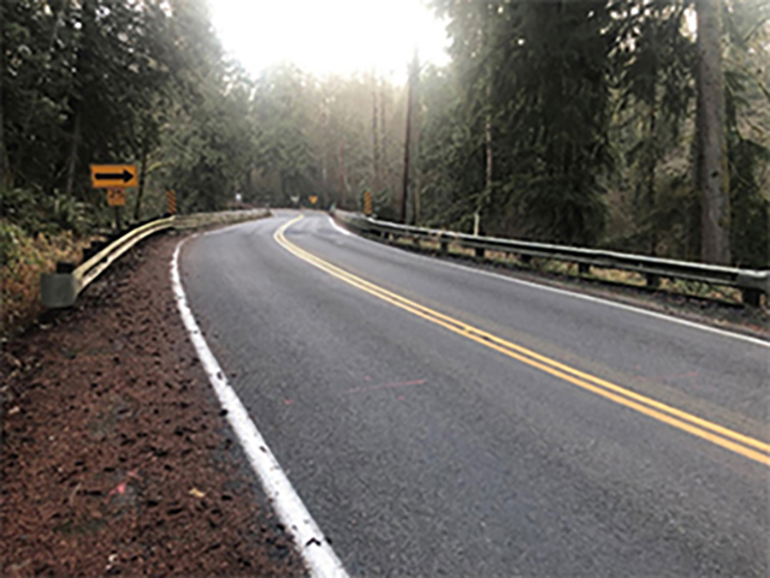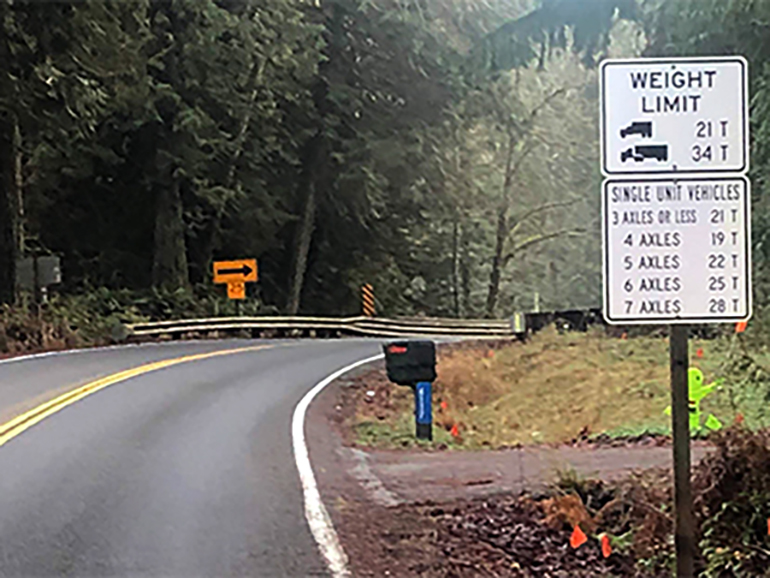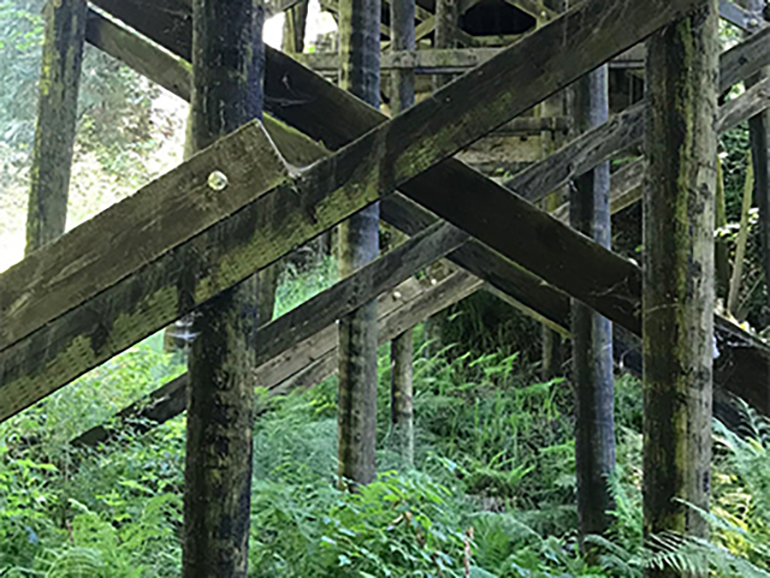Ames Lake Trestle Bridge Replacement Project
Bridge opened on April 25, 2025

The Ames Lake Bridge opened to the community on April 25, 2025, after a 10-month closure for replacement of the almost 100 year old trestle bridge.
Status update
July 24, 2025
The Ames Lake Bridge opened to the community on April 25, 2025, after a 10-month closure for replacement of the almost 100-year-old trestle bridge. An additional 4-day closure in July 2025 was required to repair bridge expansion joints. The road has now officially reopened to traffic. The crew will return in early fall to add new plantings and continue project cleanup.
Thank you to the community for your patience and cooperation while we restored this important route.
Project overview
This project replaced the 100-year-old Ames Lake Trestle Bridge on Ames Lake-Carnation Rd NE with a wider structure and straighter bridge approaches. The improvements increase sight distance for drivers and provide a safe, unrestricted crossing for trucks and vehicles of all sizes. In addition, the new bridge has less environmental impact on Ames Creek and the surrounding wetlands.
The new bridge was built in the same location as the original structure and has no weight restrictions. Construction began on June 24, 2024, and the replacement opened on April 25, 2025.
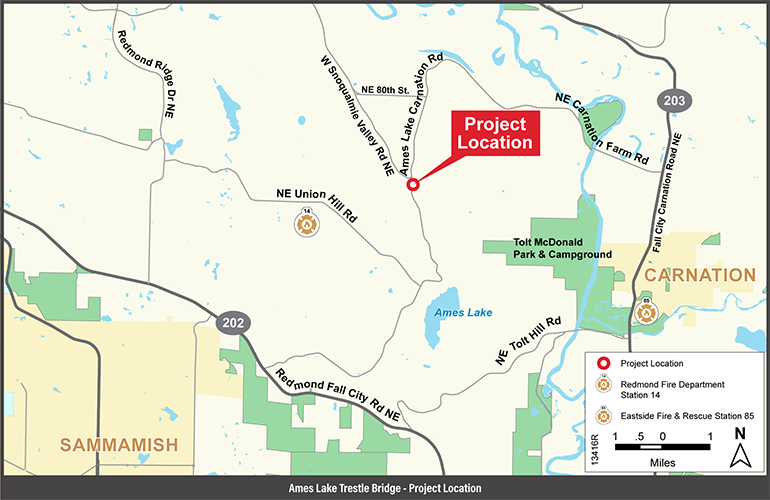
The bridge crosses Ames Creek on Ames Lake-Carnation Road NE, in rural unincorporated King County between Redmond, WA and Carnation, WA. View larger image (347KB)
Why did King County replace the bridge?
The Ames Lake Trestle Bridge was built 100 years ago and was originally designed with narrow lanes for much smaller vehicles compared with what we see on the road today. The previous bridge had a posted weight restriction for specific large trucks and specialized hauling vehicles. The new bridge provides a safer, unrestricted crossing for the community.
The timber piles that supported the old deck were decaying. Over time, the poor condition of the piles prohibited large trucks and emergency vehicles from crossing, which eventually could have required the bridge to be shut down completely.
Project timeline
Summer 2024:
- The project began on June 24, 2024.
- During construction, Ames Lake-Carnation Road NE, between W. Snoqualmie Valley Road NE and NE 52nd Street, was closed to all vehicles, bicycles, and pedestrians at the bridge location.
Fall 2024 thru winter 2025:
- The bridge was under construction and closed to all traffic, including emergency vehicles and school buses, through April 25, 2025.
Spring 2025:
- Major construction complete.
New bridge layout
The new Ames Lake Trestle Bridge is wider, straighter and safer than the previous bridge. There is also improved visibility for oncoming traffic. All of these improvements allow those coming out of adjacent driveways to see farther down the road.
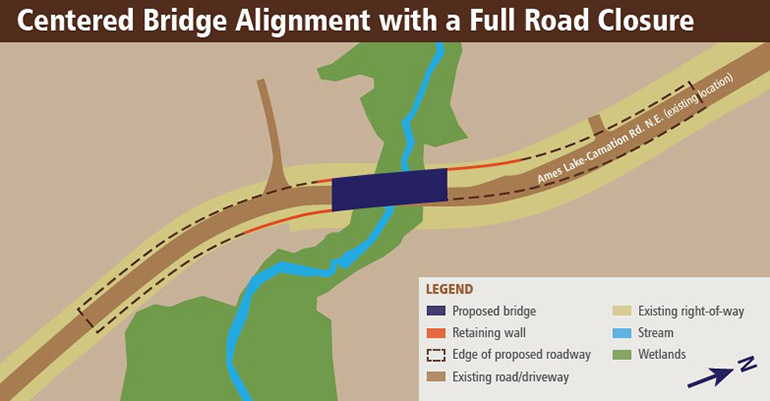
The new bridge is in the same place as the previous bridge. Building it in the same spot required less ground shoring and leveling (grading). It also minimizes the size of the retaining walls that were required.
Photos

July 2025 - Crews saw away concrete to access the expansion joint.
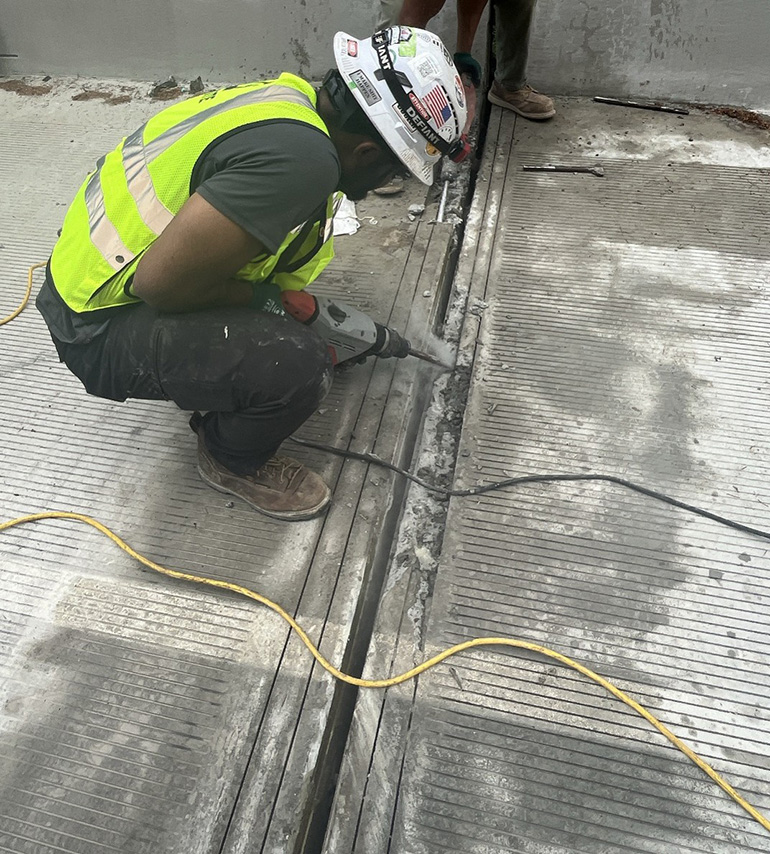
July 2025 - Crews saw away concrete to access the expansion joint.

July 2025 - Crew members fill the space around the expansion joint after replacement. This allows for movement of the surrounding concrete while preventing issues such as water penetration and weed growth.
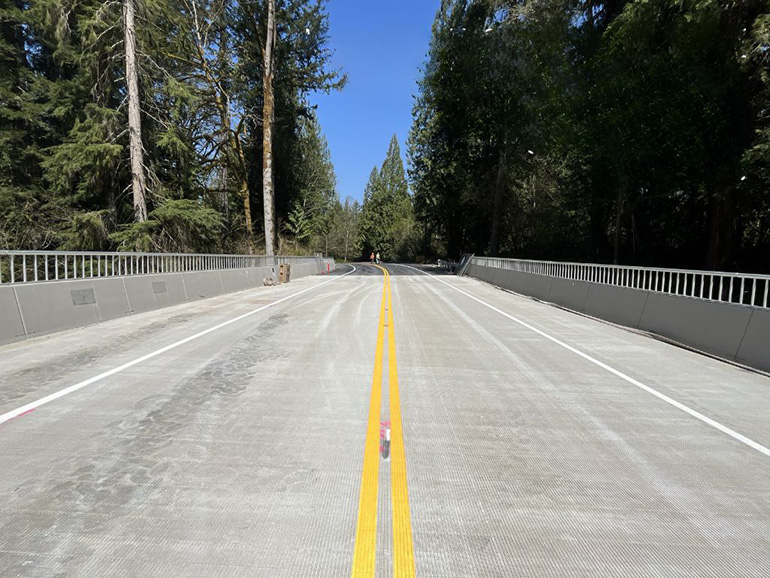
April 2025 – Lane striping and pavement grooving is complete along the bridge. The bridge will reopen to the public on April 25, 2025, by 7 pm.
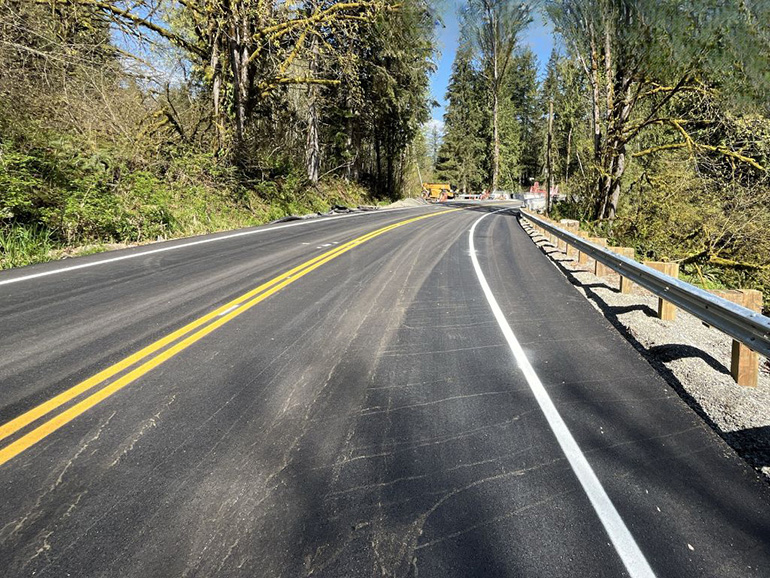
April 2025 – New pavement, lane markings and guardrail are now complete on Ames Lake-Carnation Rd NE approaching the north and south ends of the bridge.
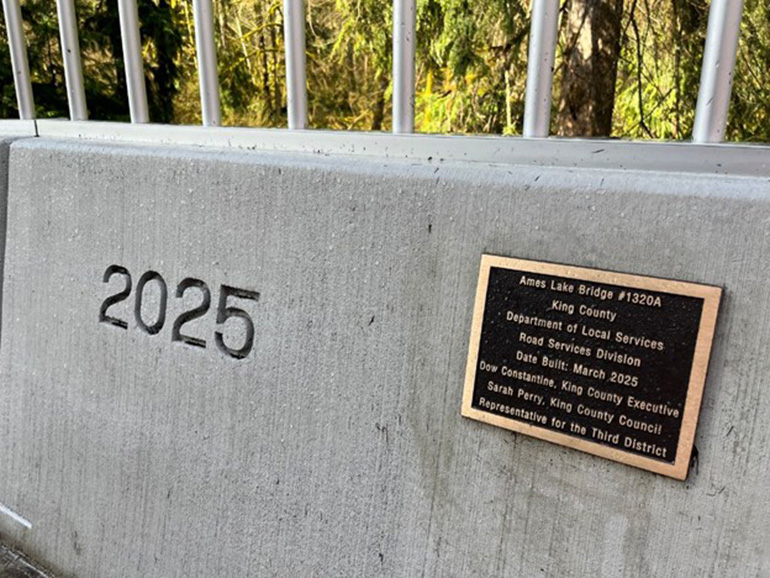
April 2025 – A placard installed on the approach wall of the new bridge, commemorating its establishment
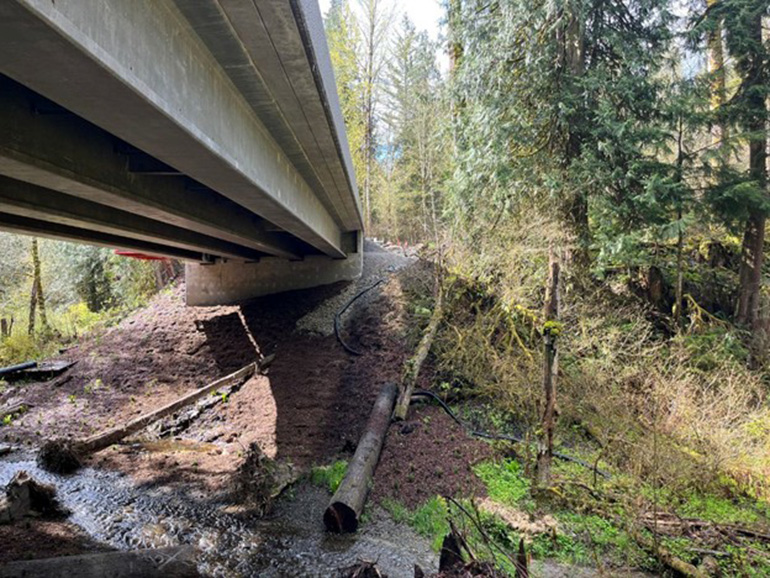
April 2025 – Plastic tarping was used for the duration of the project to protect Ames Creek from construction debris. The tarping is now removed and the rushing stream has been well-equipped with natural materials to promote a thriving ecosystem.
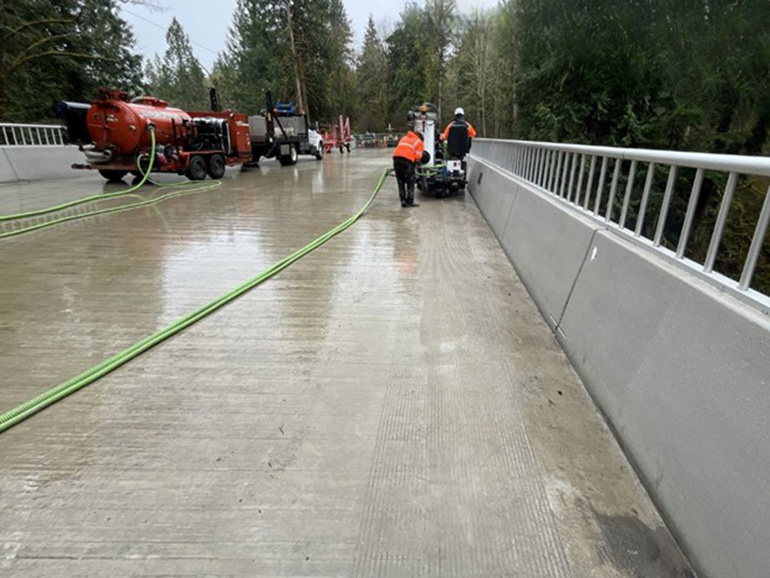
April 2025 – A pavement groover is used to create small lines along the bridge deck. This is an important step that increases traction and provides efficient drainage.
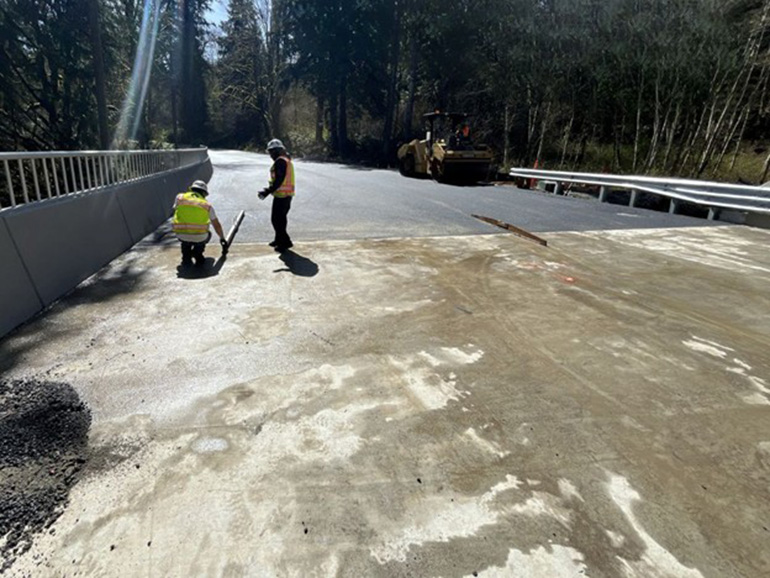
April 2025 – Crewmembers use levels to ensure a seamless transition between the newly paved road and the concrete bridge deck.
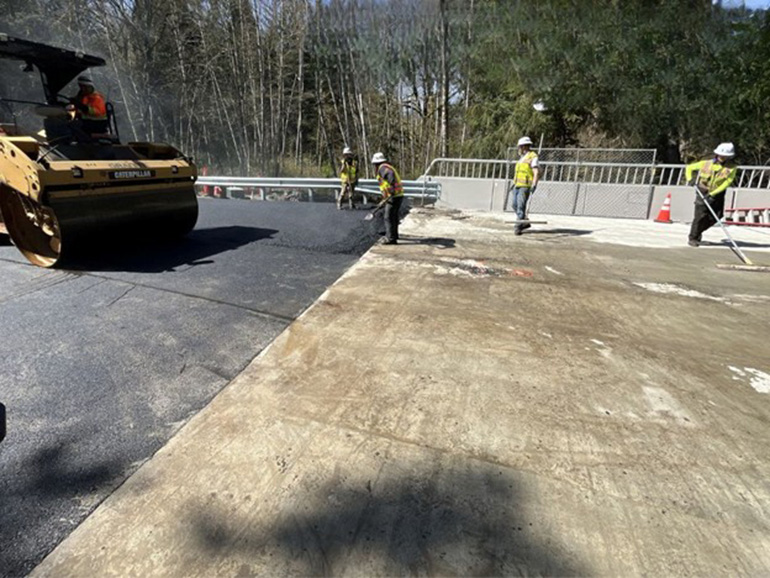
April 2025 – The newly paved section of the road connects directly to the bridge approach.
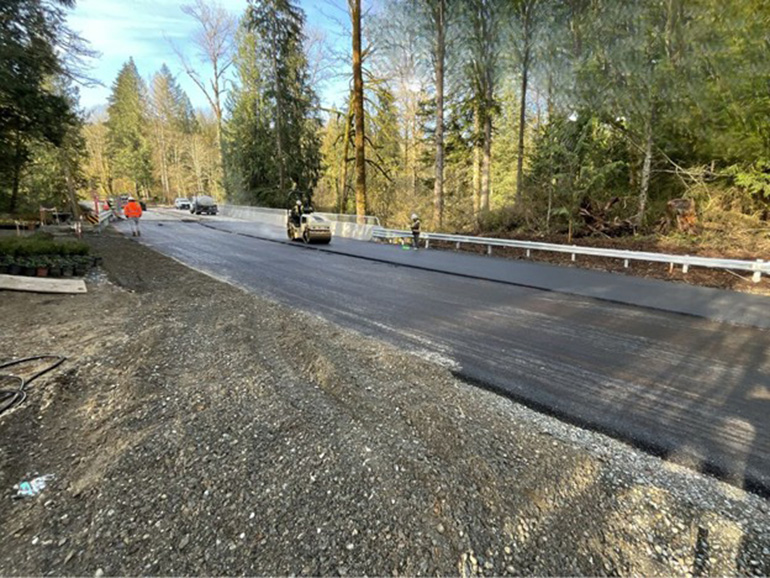
April 2025 – A crewmember uses a rolling compactor to press asphalt evenly and firmly onto the road surface.
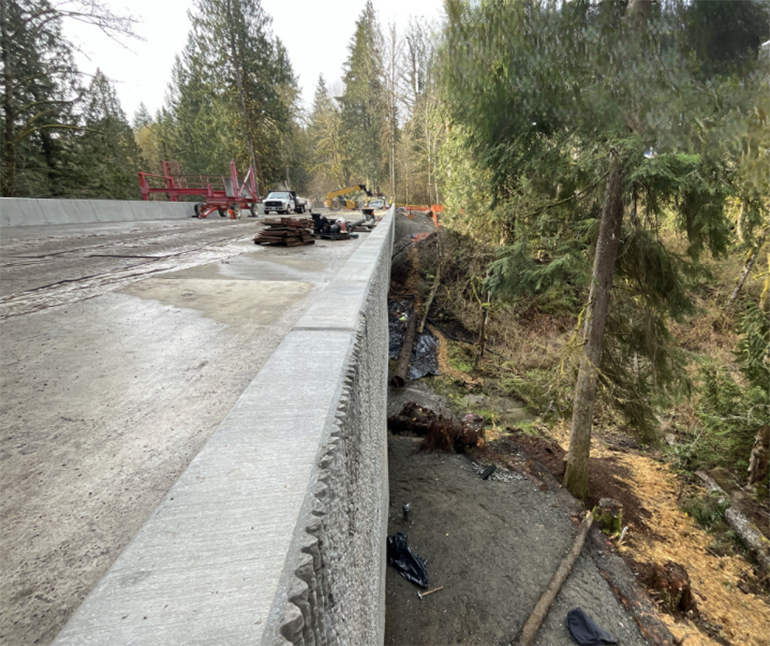
March 2025 - A look down the newly sealed and cured bridge barrier, ready to stand strong against the elements.
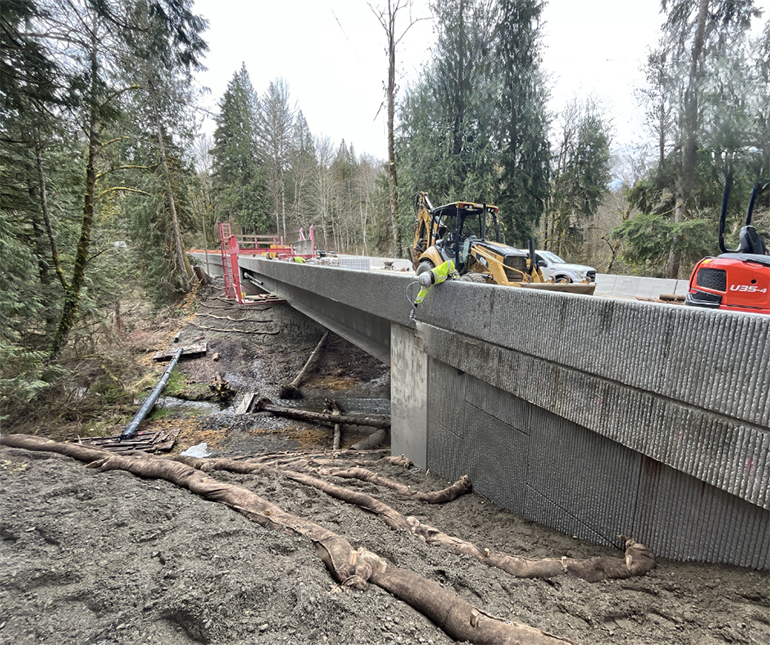
March 2025 - A crew member applies sealant to the exposed concrete, creating a protective layer that helps prevent water, chemicals, and other elements from seeping in, extending the life of the structure.
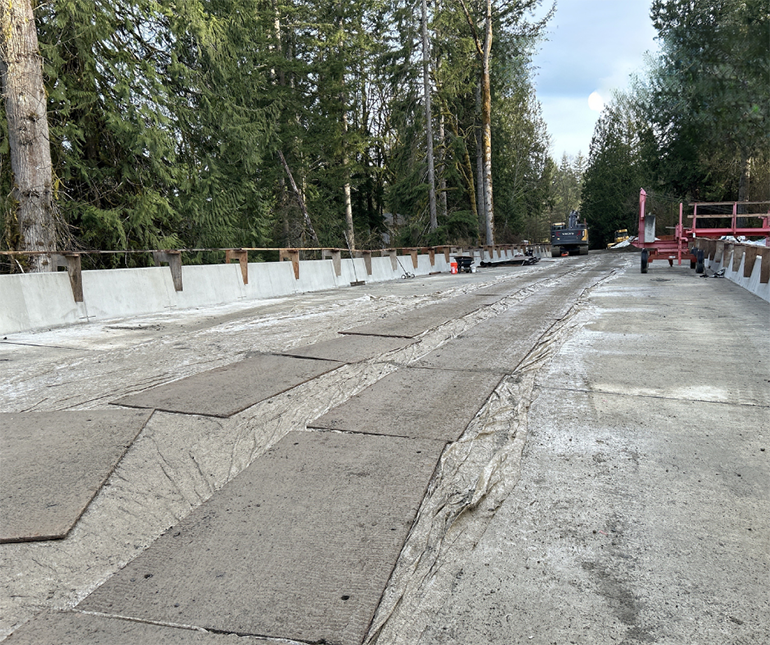
March 2025 - Plywood sheets placed over plastic help protect the new bridge deck before paving. Unauthorized travel across the bridge before final paving could cause damage to the underlying structure and therefore delay the reopening.
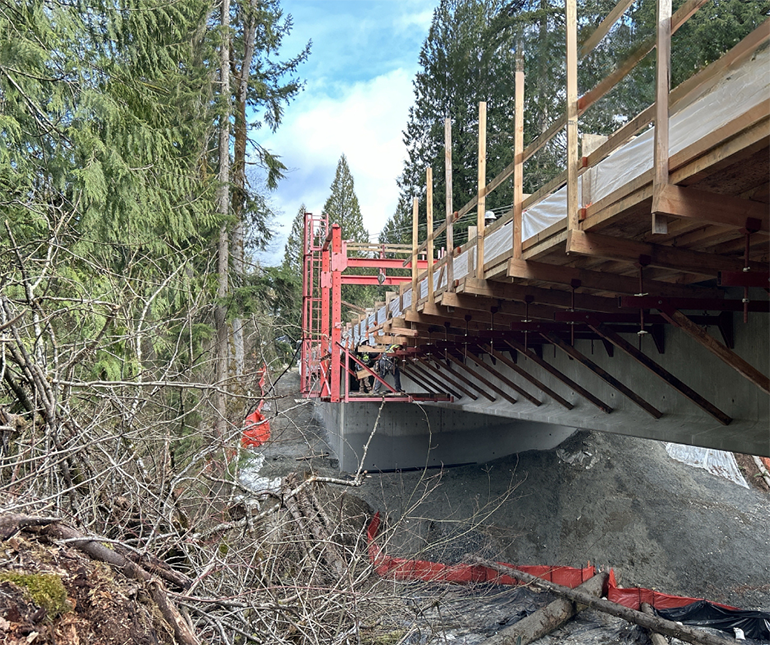
February 2025 - The red overhanging platform is called a stripping buggy. This equipment lets crews climb down and remove the remaining form work and bracing used to build the bridge deck.
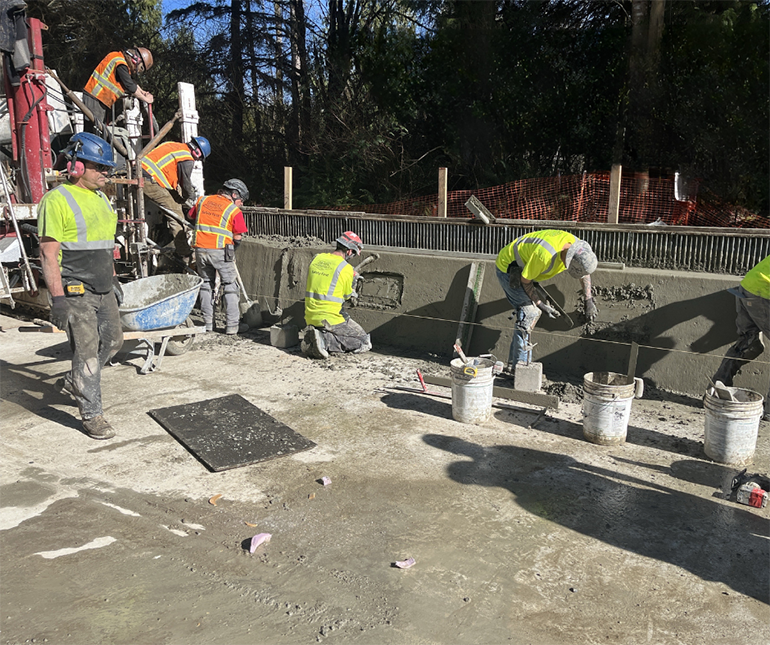
February 2025 - Crews are hard at work placing the concrete bridge barrier. The slipform machine on the left shapes the barrier, while team members smooth out the fresh concrete for a clean finish.
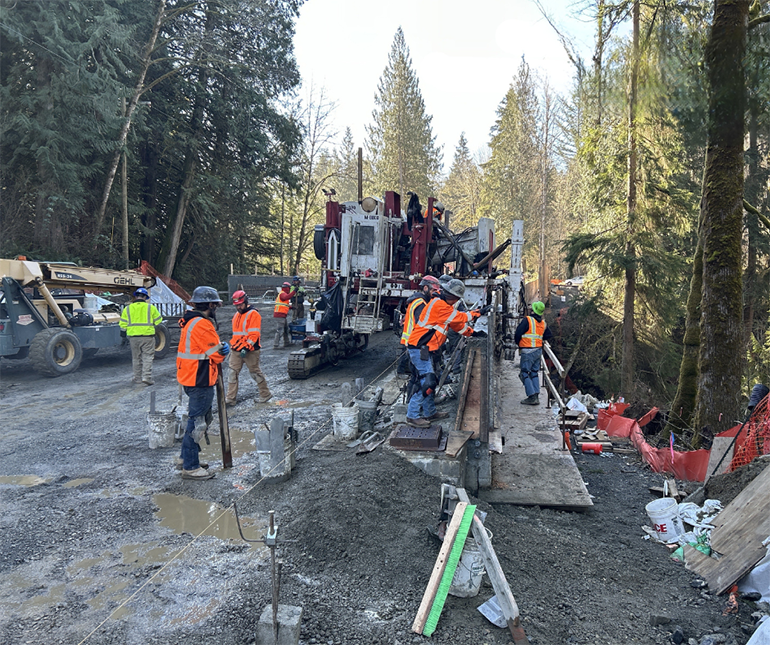
February 2025 - Crews setting up a barrier slipform machine, which is used to create long, smooth concrete barriers right on-site, without breaks. It works like a mold that shapes the concrete as it’s poured, adjusting to the curves and slopes of the road for a perfect fit.
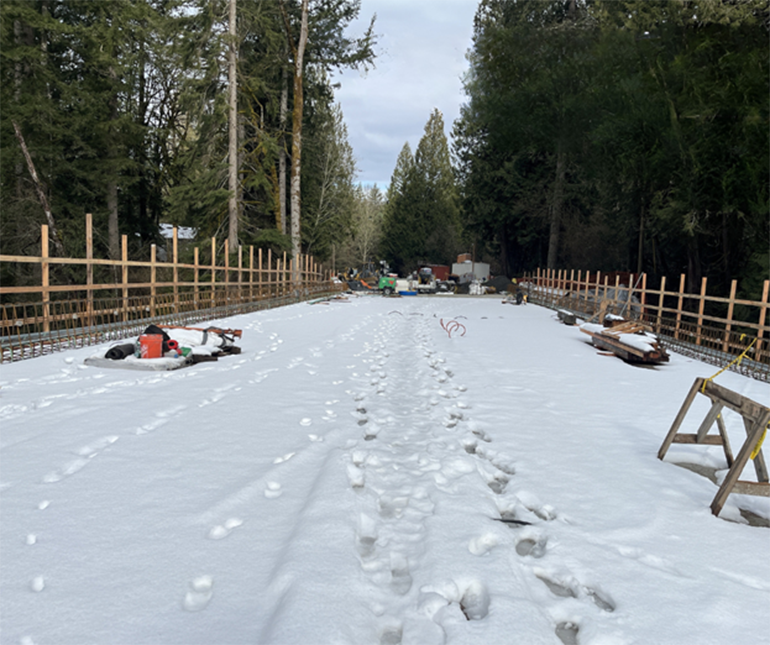
February 2025: Persistent, heavy wet snow paused construction until it melted, and crews could access the ground.
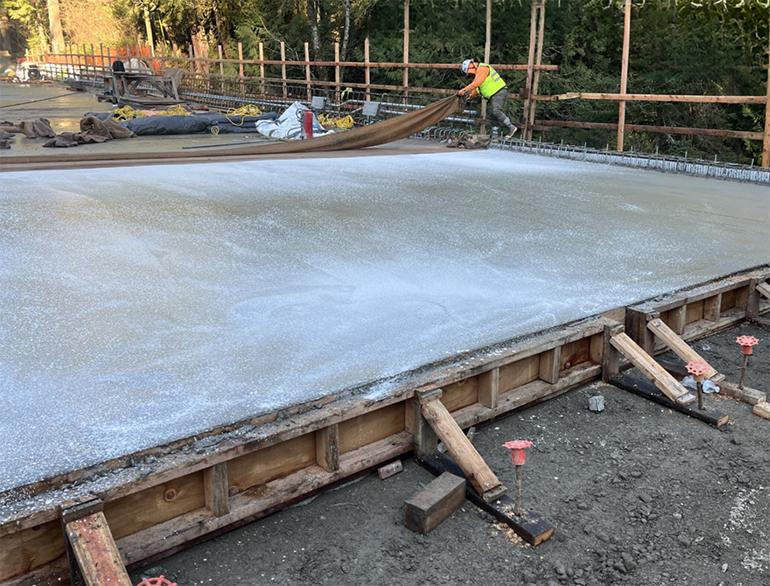
January 2025 – A white liquid curing compound is required to be placed on top of the wet concrete to help the concrete set in place.
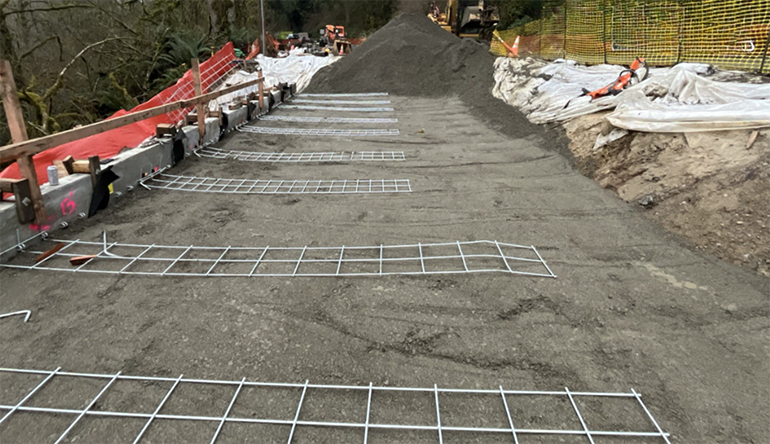
January 2025 – These grids connect to the wall reinforcement panels and will hold the wall in place once gravel material is placed over and compacted. Later, the roadway will be paved on top.
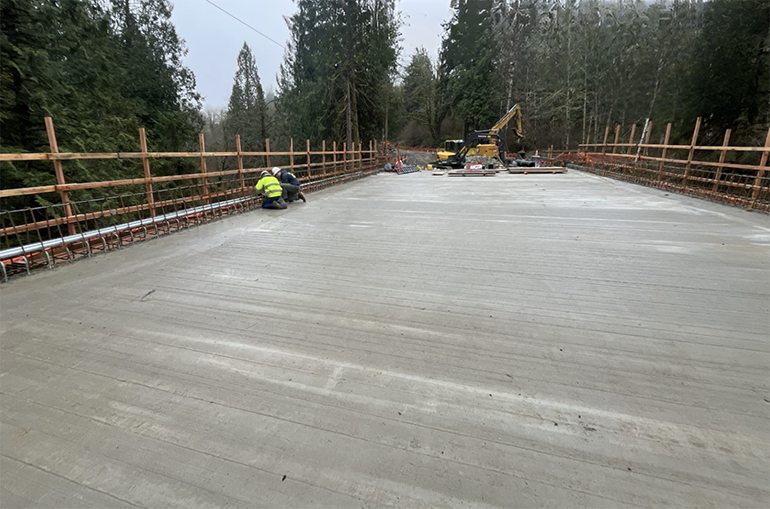
January 2025 – Concrete has been poured over the surface this section of the bridge deck. It will be the surface that traffic will drive over once it is cured and the bridge is open to vehicles, bicycles, and pedestrians.
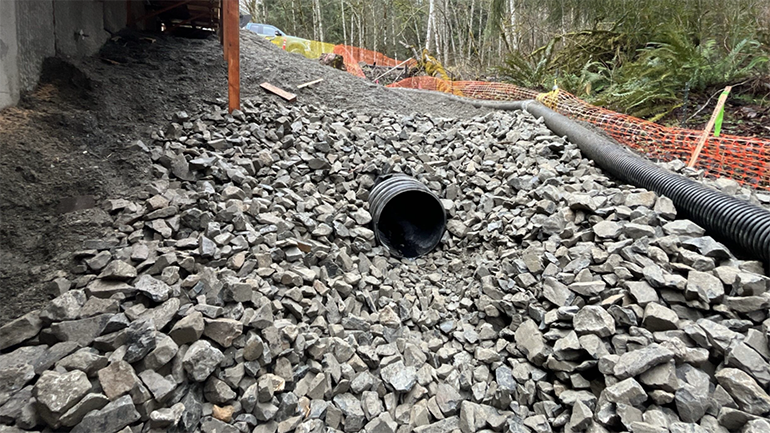
January 2025 – A new drainage outlet is created to connect a new stormwater system that begins on the bridge deck as well as an existing roadside system.
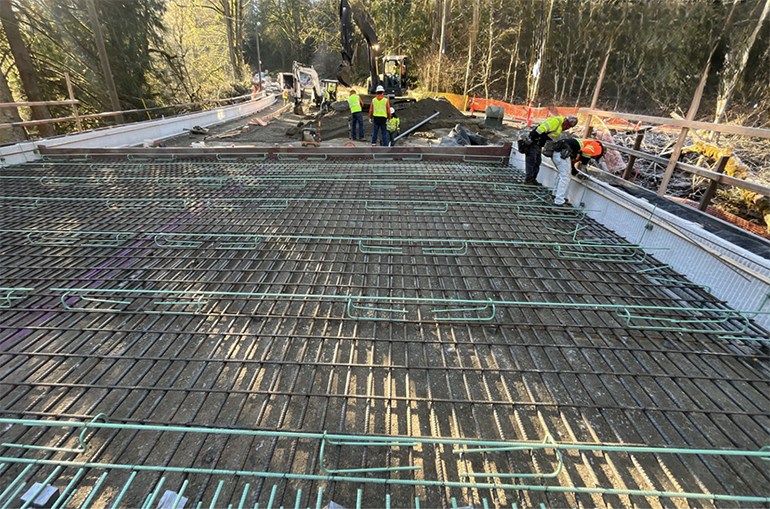
January 2025 – Crews begin to place a second layer of rebar across the southern-most section of the bridge. The small green bars, called “standees,” hold the top layer (long green rebar) with the proper spacing above the bottom layer (brown rebar).
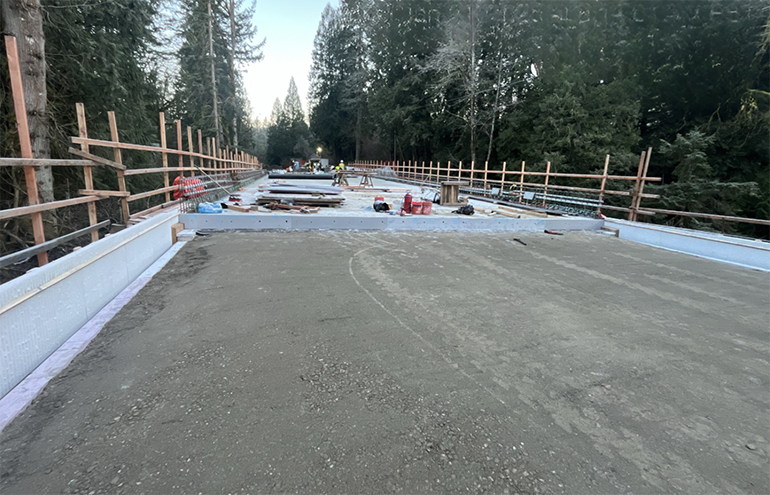
January 2025 – Work is done in small sections to maximize efficiency and progress of the bridge deck. Here, the subgrade material has been set and compacted, awaiting carpenters to place supportive wood forms across the bridge approach. Iron crews can then construct rebar layers to prepare this section of the structure for concrete placement.
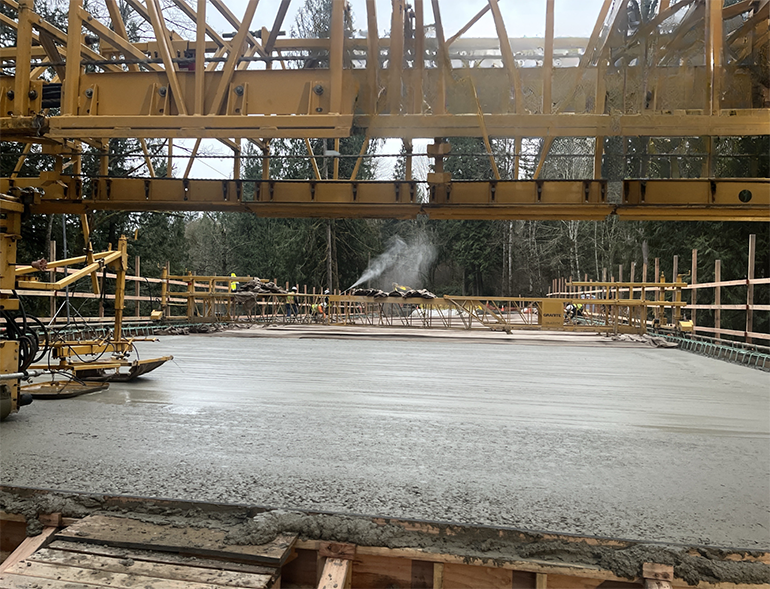
December 2024 – Freshly poured concrete is leveled by the concrete paving machine for a smooth finish. Once the concrete cures over the next several weeks, crews will apply additional surface treatments to create a durable roadway.
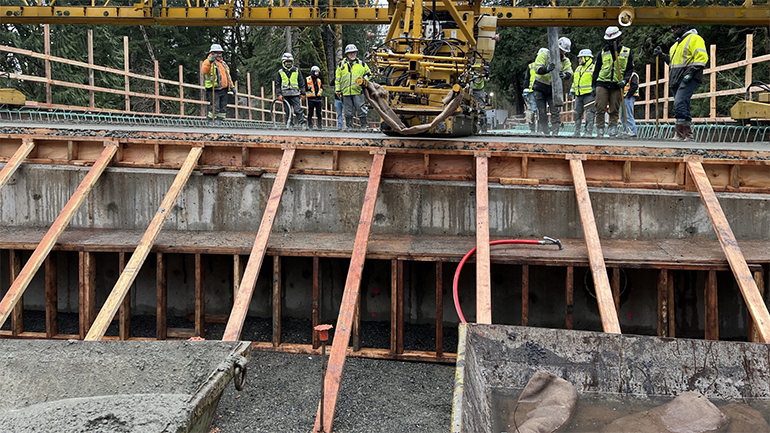
December 2024 – Concrete paving machinery levels freshly poured concrete along the bridge deck near the south end. This specialized equipment ensures a smooth and even surface, critical for the bridge's structural integrity and long-term durability.
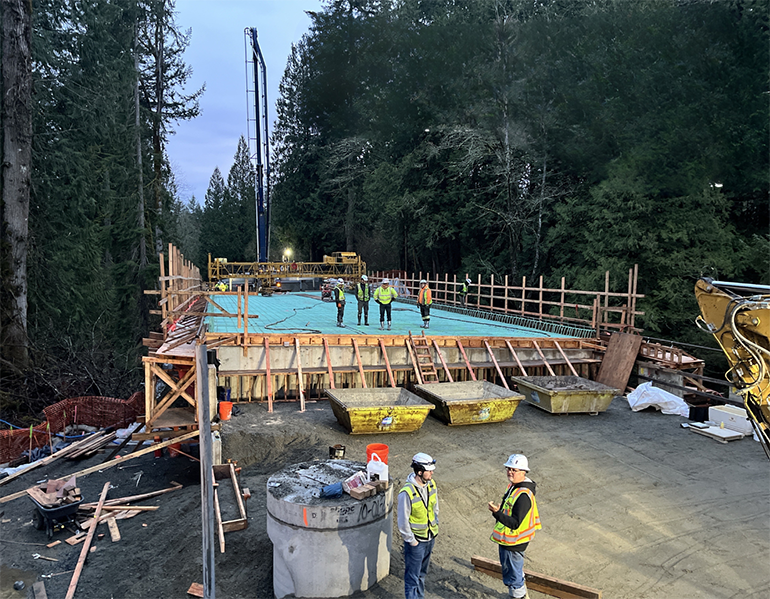
December 2024 – Crews prepare for concrete to be poured slowly and evenly to strengthen the bridge deck and ensure durability. A large concrete “boom” pump truck will help to dispense concrete from north side of the bridge to the south side.
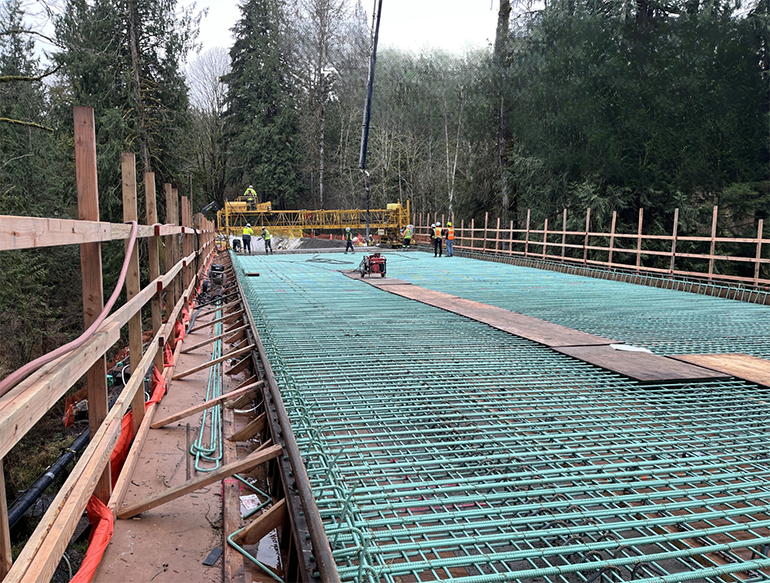
December 2024 – Reinforcement steel is used to provide additional strength and support to the structure. These blue brackets help prevent cracking and ensure stability of the deck.
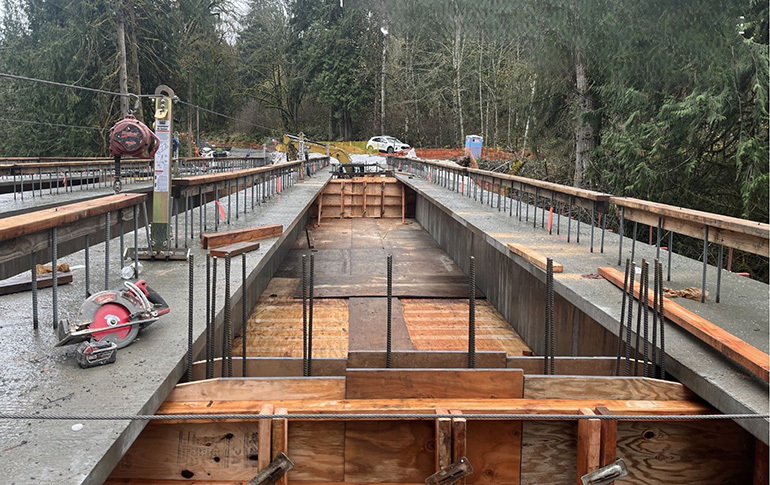
November 2024 - Temporary decking provides a safe surface for workers as they prepare to pour concrete for the bridge deck.
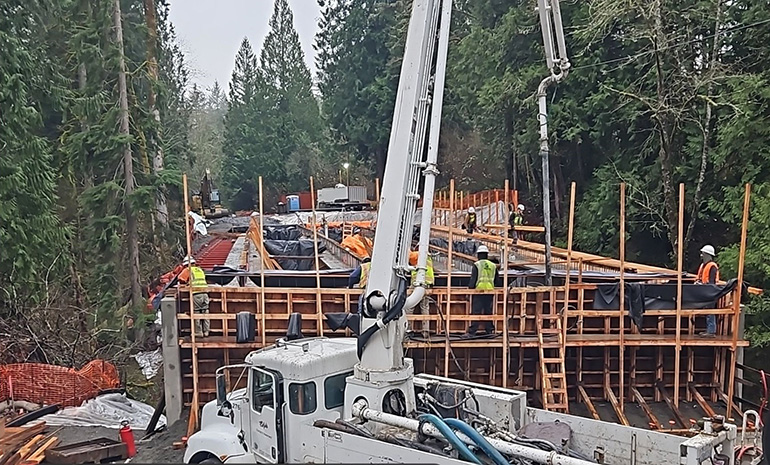
November 2024 - Crews pour concrete at the end of the bridge to brace each end of the bridge. This design keeps the bridge stable in high winds.
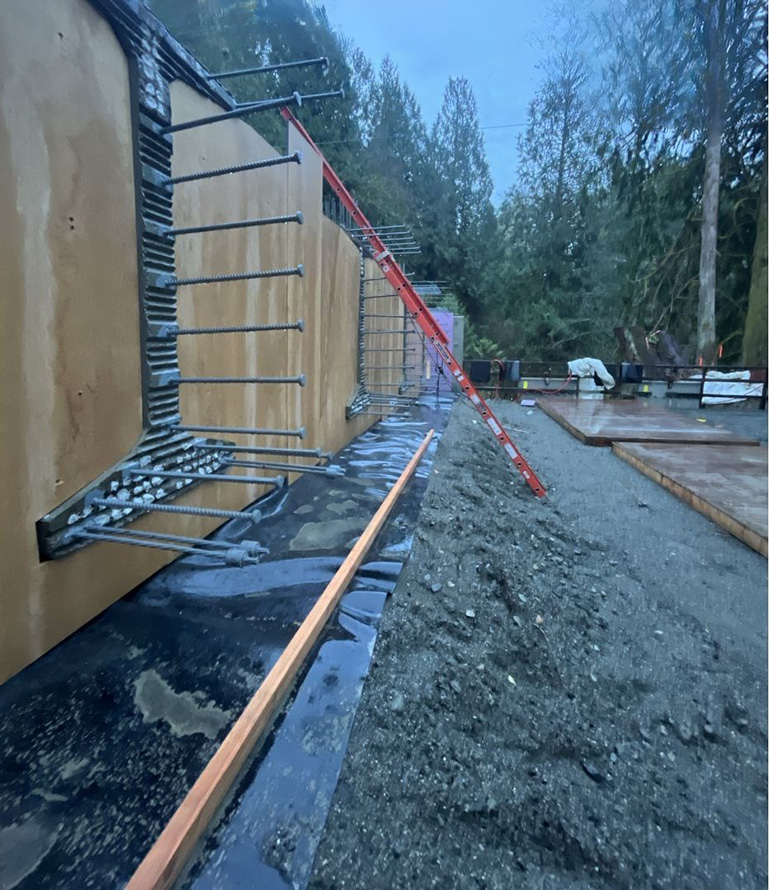
November 2024 - Crews pour concrete at the end of the bridge to brace each end of the bridge. This design keeps the bridge stable in high winds.
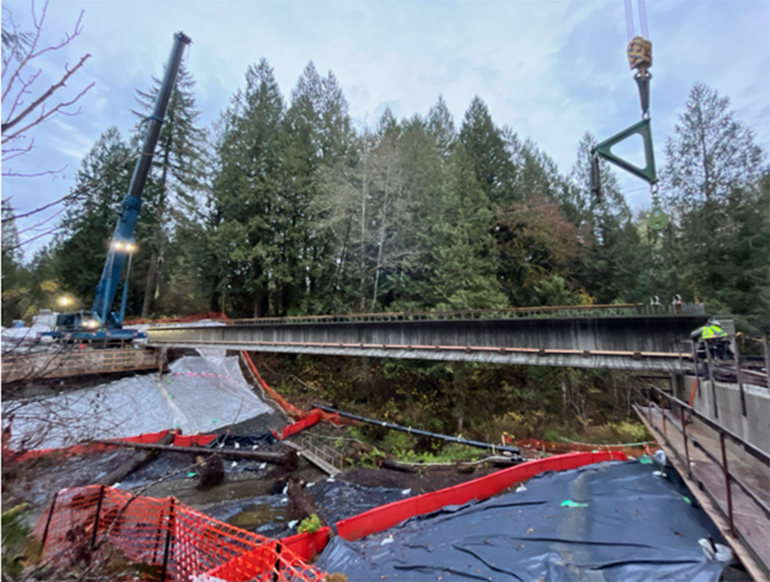
November 2024 – The first girder is anchored horizontally between the two abutment walls. This beam, along with three others, will carry the weight of the bridge deck.
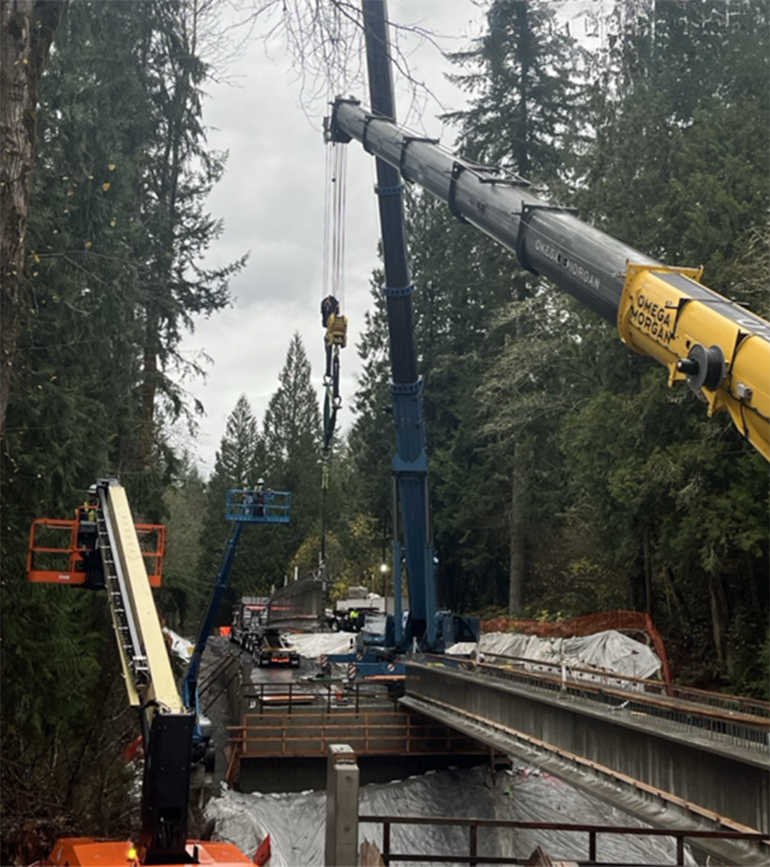
November 2024 – Girders are concrete beams that serve as the primary support for the bridge deck. Cranes are used to guide these girders into place over Ames Creek.
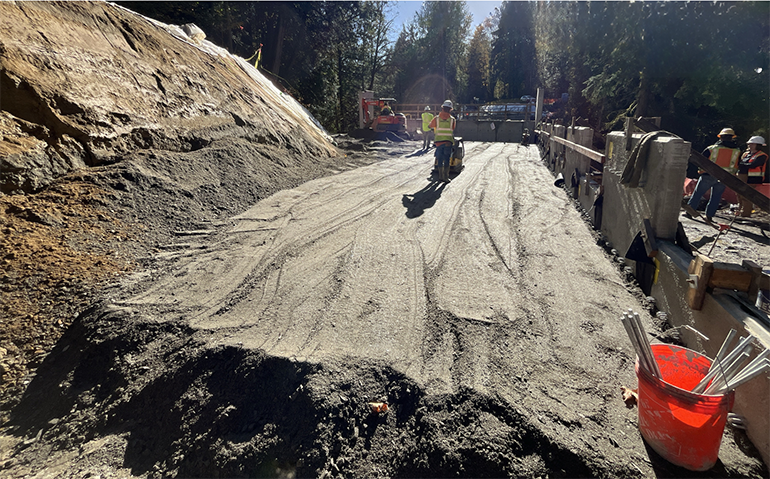
October 2024 – A crewmember uses a vibrating compactor to apply even pressure and compact the fill behind the wall reinforcement panels. This helps make the soil stronger by bringing its particles closer together, increasing friction between them when pressure is applied, and reducing unwanted sinking or settling.
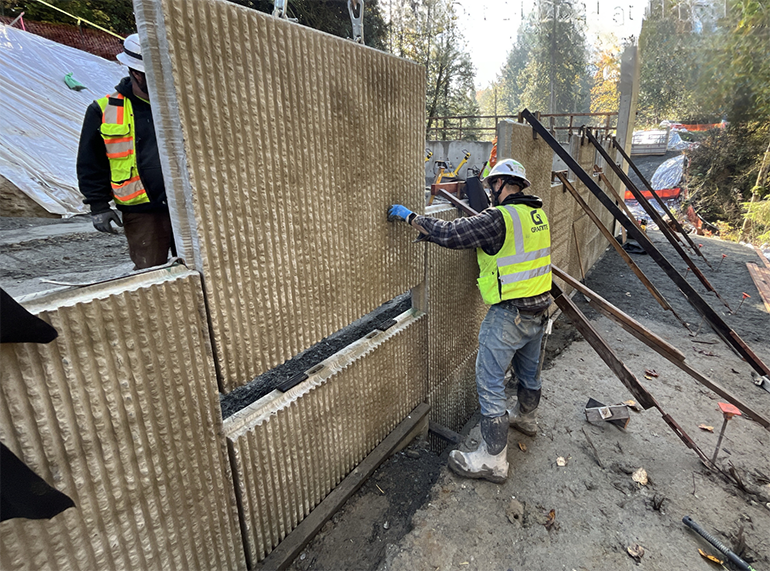
October 2024 – Crews place structural earth wall panels along the edges of the bridge approach. These panels help hold the soil in place, prevent erosion, and provide a stable base for the bridge by distributing the weight evenly.
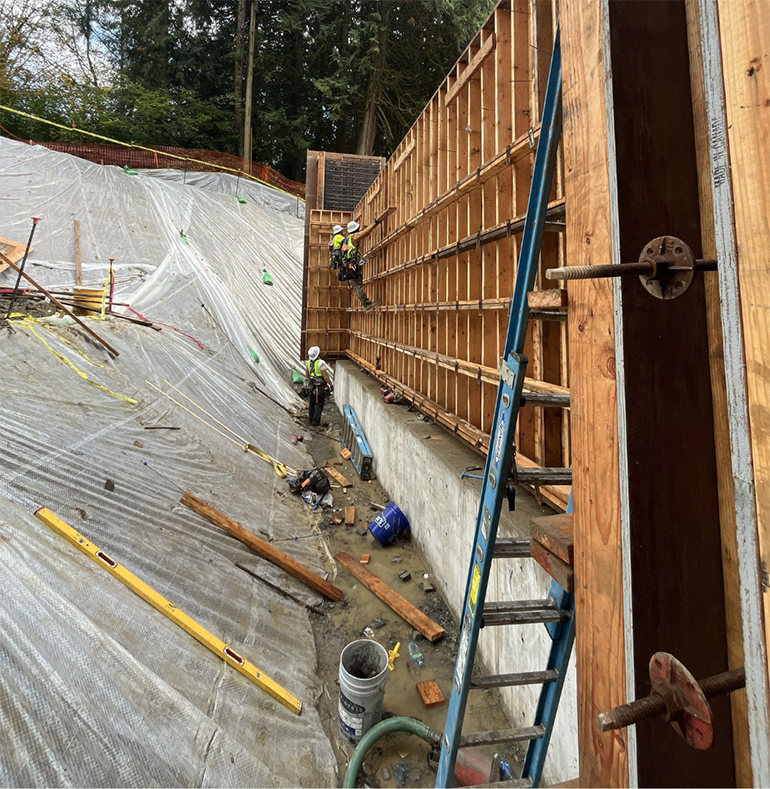
October 2024 – Crews build wood formwork on the north abutment wall. This wall will perform the important duties of connecting the northern bridge approach to the bridge and channeling the force of moving objects on the bridge to the ground.
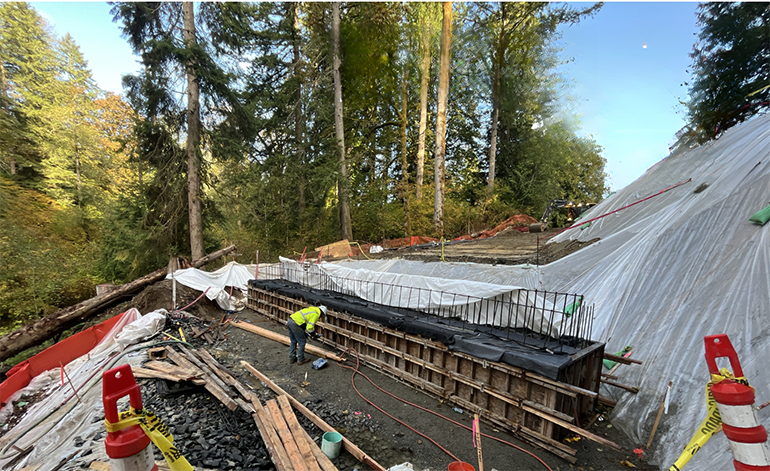
October 2024 – A crewmember inspects the foundation for the northern abutment wall, which is comprised of three buried 5-foot diameter concrete shafts that extend 60 feet into the ground. The deep structure is topped off with concrete, and crews will begin building up the abutment wall after the concrete cures.
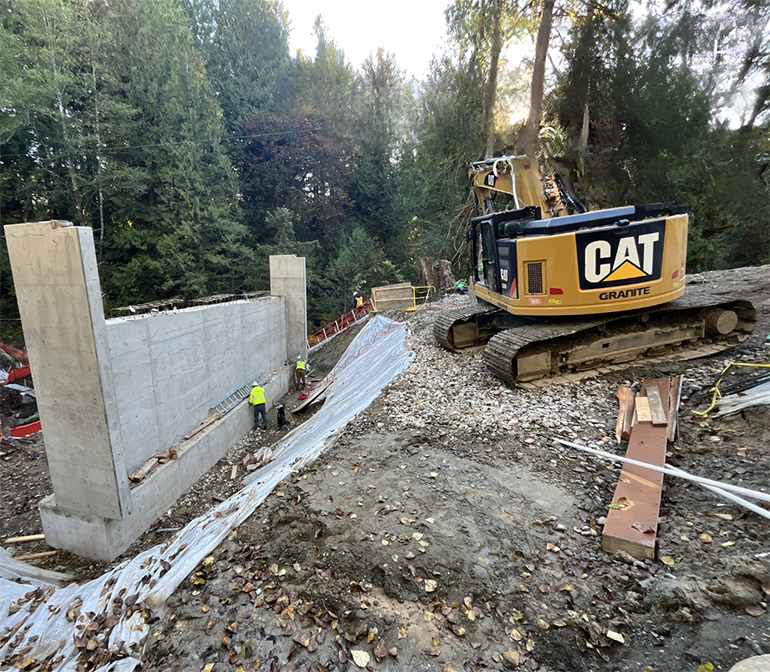
October 2024 – The wood forms of the southern abutment wall, which contained the concrete as it hardened, has now been removed. This wall is strong and stable, and ready to support the new bridge approach.
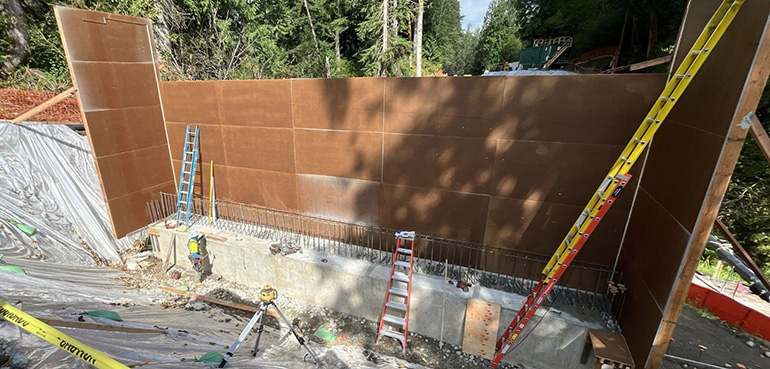
September 2024 – Another view of the south facing abutment wall. The wall also functions as a retaining wall, as it stands between the approach embankments and the bridge structure.
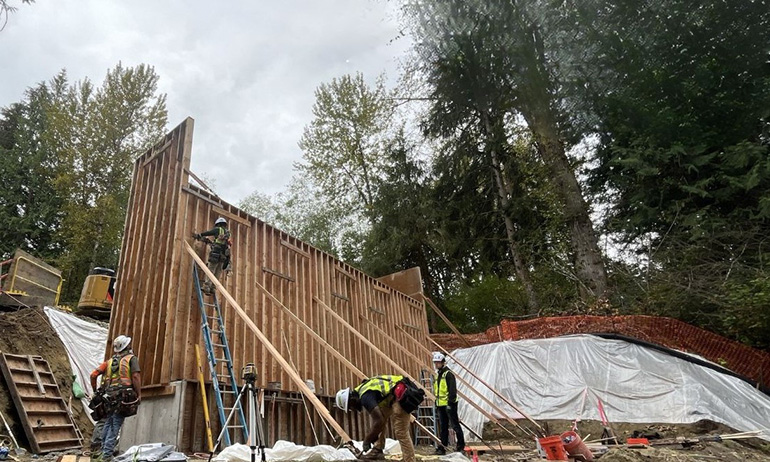
September 2024 – Crews built the frame for the south abutment wall of the new bridge.
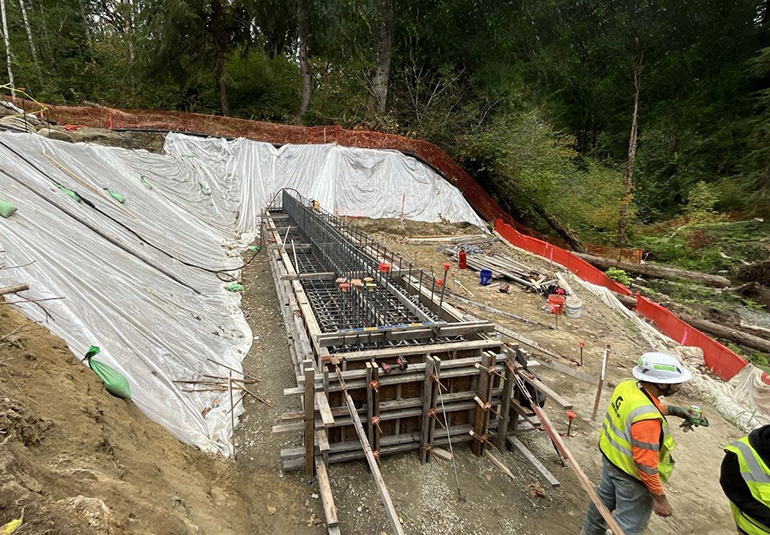
September 2024 – Crews build the foundation for the southern abutment wall, which will be more stable after it is filled with concrete. Abutment walls perform a very important role in a bridge’s supportive foundation by transferring the weight of the structure & traffic to the ground.
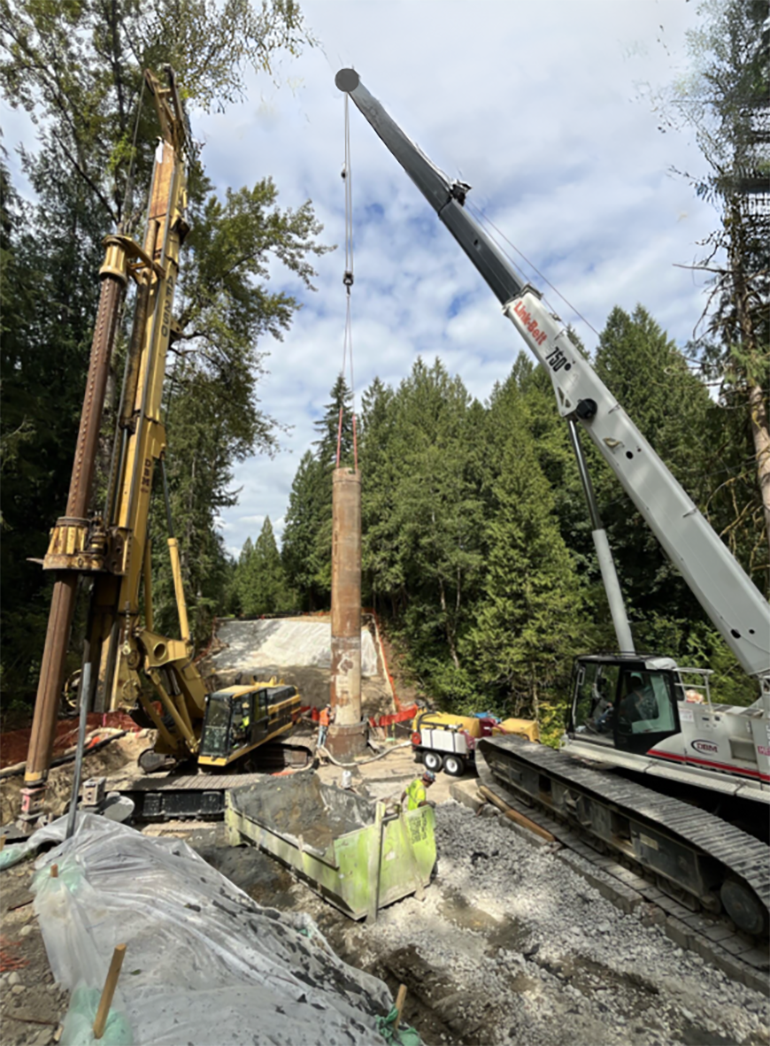
August 2024 – Large steel pipes, known as “telescoping casings,” are installed into the drilled shaft with a crane. These pipes help to prevent the deep soil from caving in after the opening has been drilled.
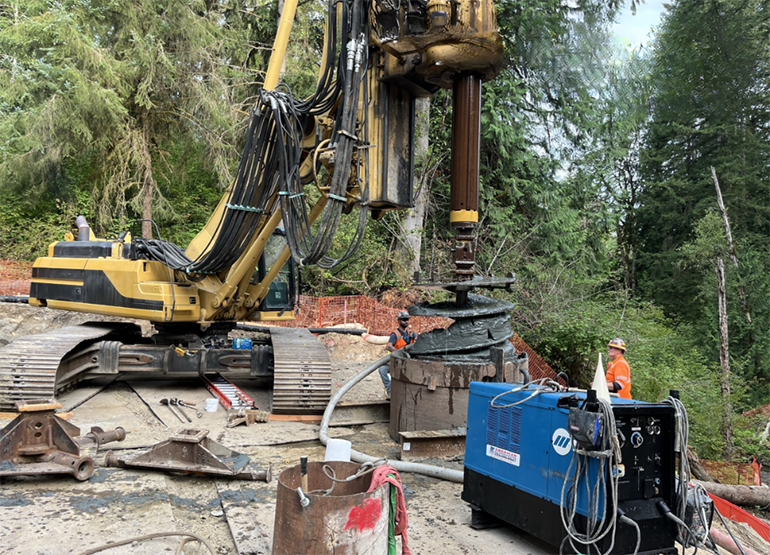
August 2024 – Crews use a giant drill to dig 75 feet deep in the earth. This is the first of three shafts that will be drilled on each side of the bridge.
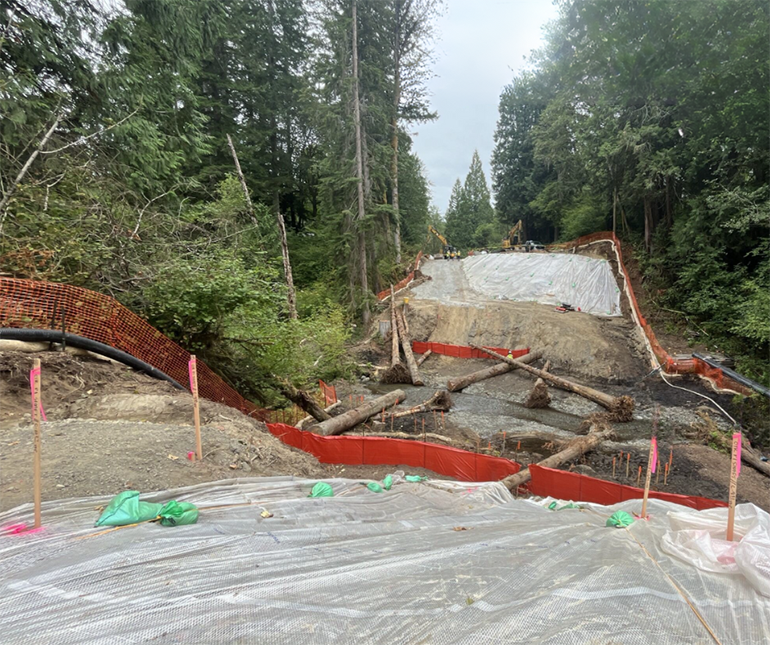
August 2024 – Plastic tarps cover both slopes to protect existing soil and prevent erosion caused by weather. The orange fencing serves a similar function by blocking erosion from entering the stream.
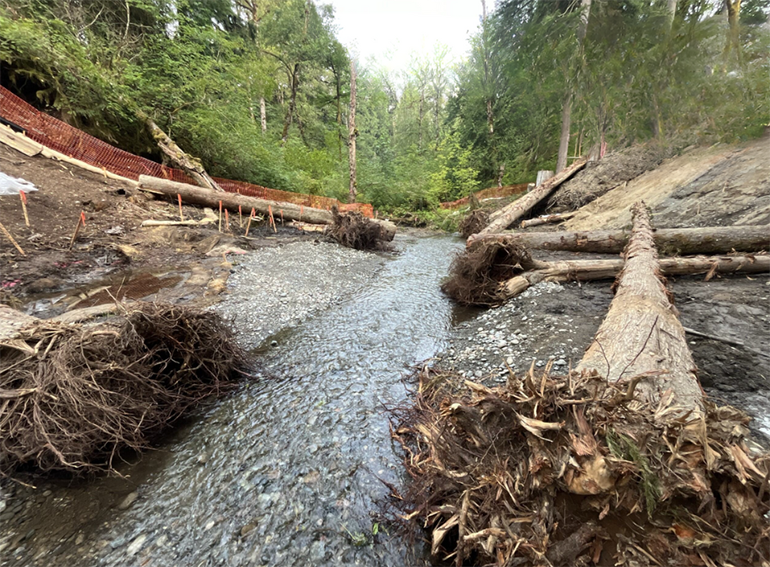
August 2024 – The project’s stream restoration is complete and ready for native spawning fish this fall. This work included the strategic placement of large logs to slow rushing water and mimic the natural flow of the stream.
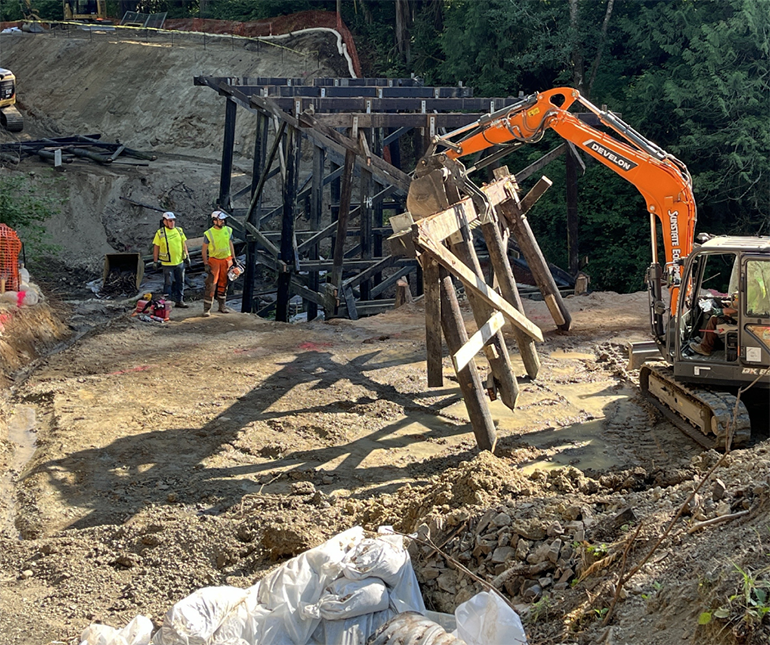
July 2024 – Crews take the final major step in bridge demolition by removing the existing creosote-treated timber piles.
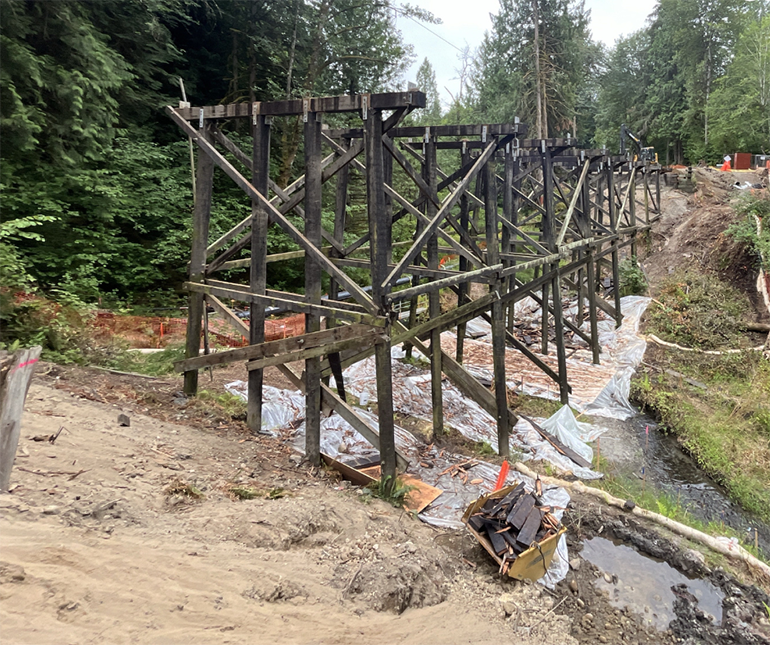
July 2024 – Crews have been careful to protect the wetlands below the bridge during construction. The tarping under the bridge helps to control erosion and reduce disruption to the environment.
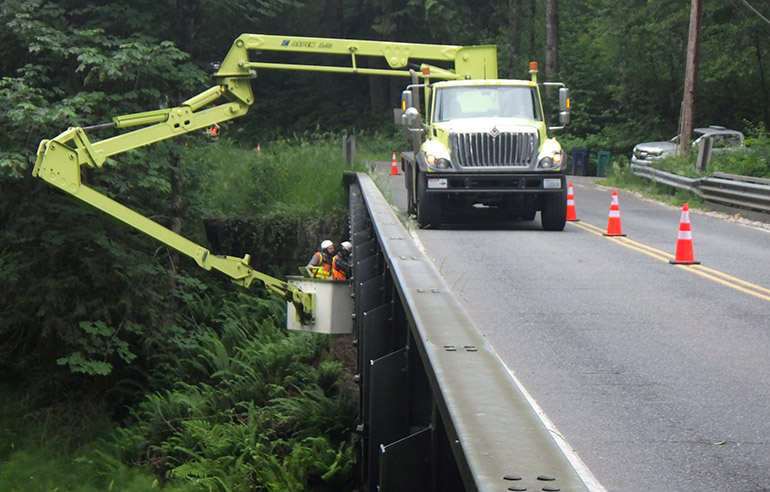
Two engineers inspect the Ames Lake Trestle Bridge from the bucket of an under-bridge-inspection-truck (UBIT) truck.
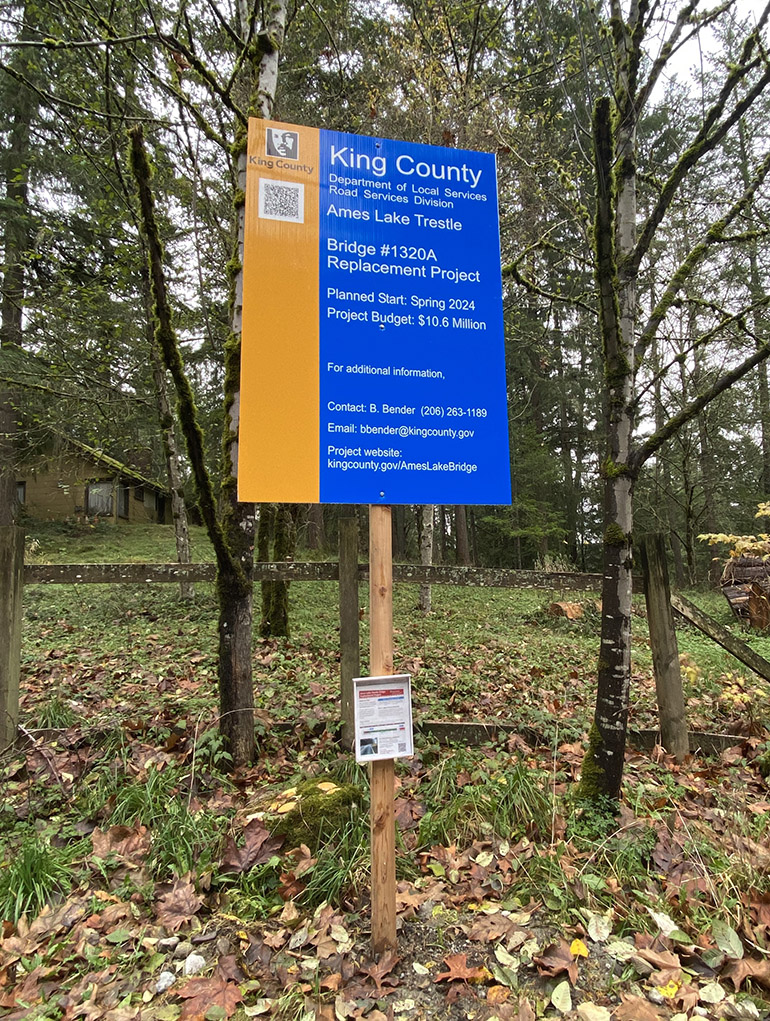
One of three official blue and yellow Ames Lake Trestle Bridge Project information signs located along Ames Lake-Carnation Road NE. Photo taken in November 2023.
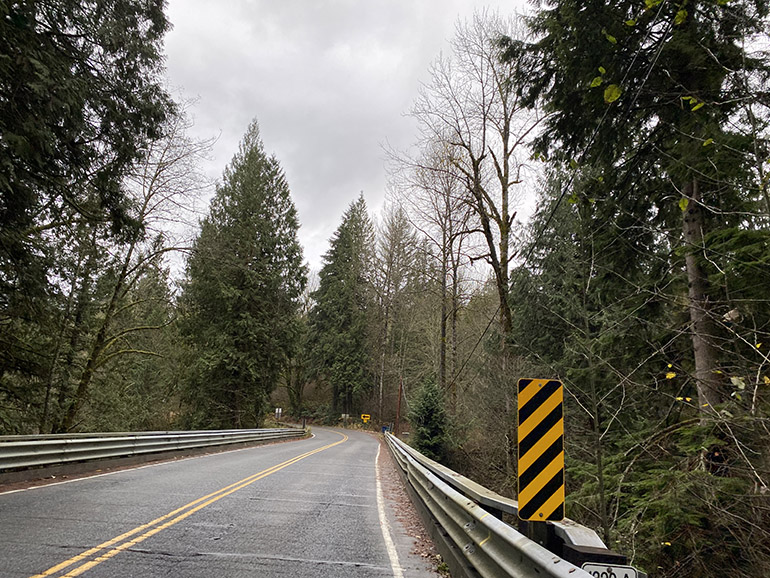
A view of the Ames Lake Trestle Bridge as seen from Ames Lake-Carnation Road NE while heading south toward NE Union Hill Road. The bridge’s complete wooden support system, which spans the creek, remains hidden beneath the road and out of view from passing traffic. Photo taken in November 2023.
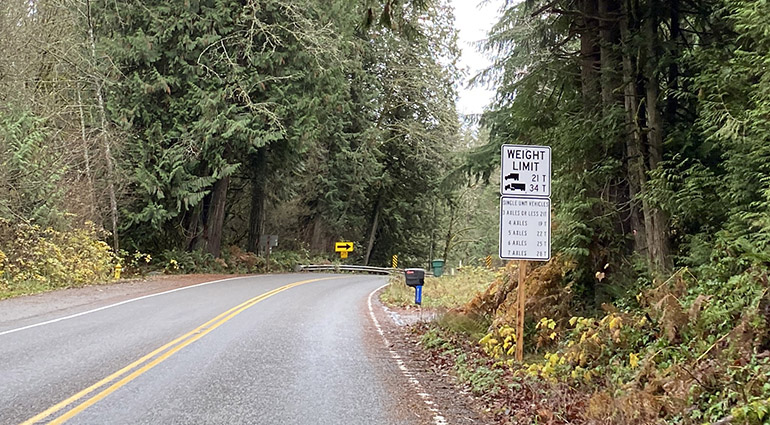
Most vehicles weighing more than 19 tons are currently too heavy to cross the Ames Lake Trestle Bridge. This sign, pictured above, provides details about which types of trucks are restricted from using the bridge. The new replacement bridge will not have any weight restrictions. Photo taken in November 2023.
Frequently asked questions
The original timber piles that supported the deck were decaying. Over time, the poor condition of the piles could prohibit large trucks and emergency vehicles from crossing, which eventually would require the bridge to be shut down completely.
Previous weight limits include:
Type 3: 21 tons
Type 3-S2: 34 tons
Single-unit vehicles:
3 axles or fewer: 21 tons
4 axles: 19 tons
5 axles: 22 tons
6 axles: 25 tons
7 axles: 28 tons
King County regularly inspects the bridges it is responsible for maintaining.
 Translate
Translate
